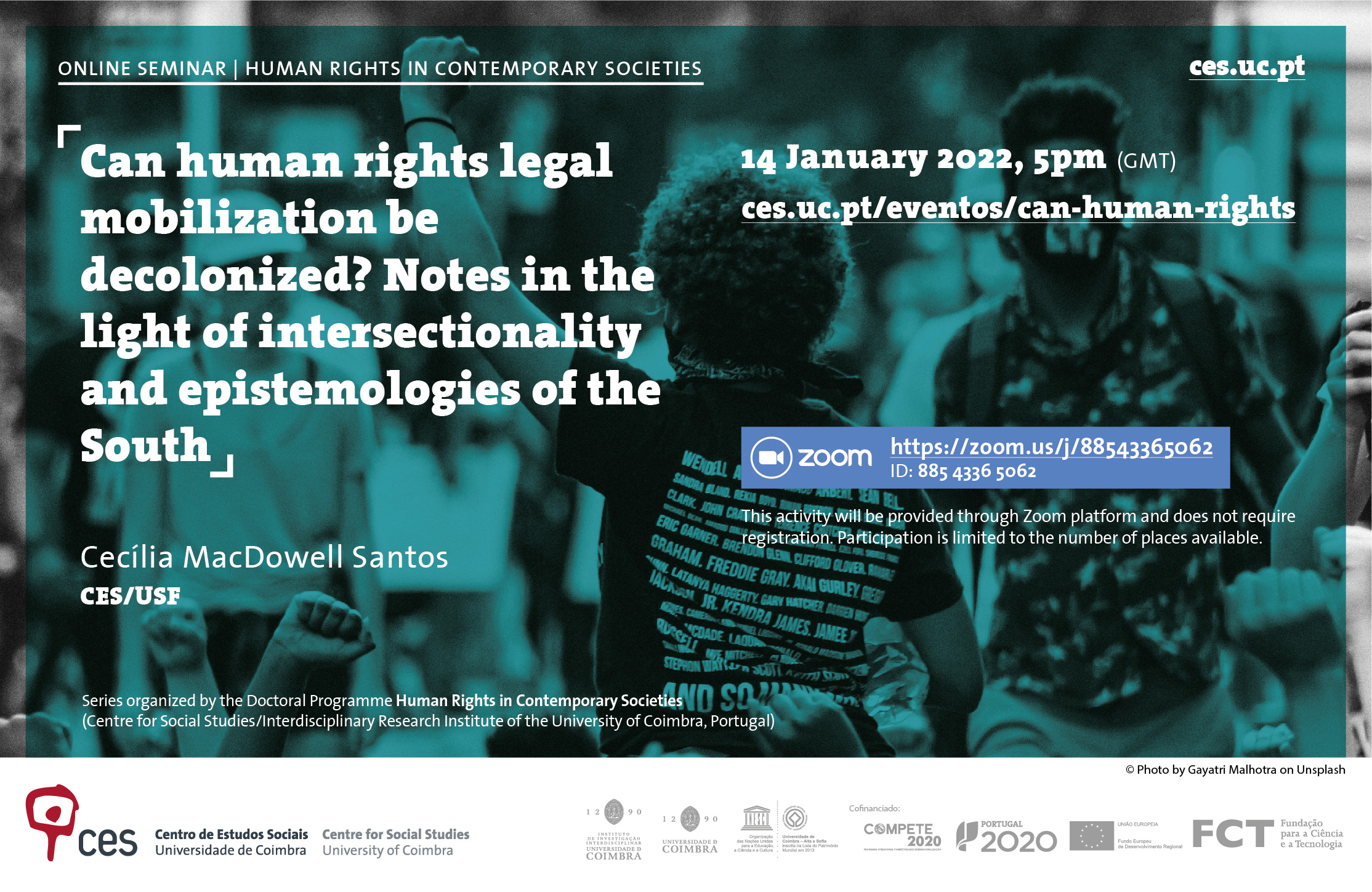Seminário
Can human rights legal mobilization be decolonized? Notes in the light of intersectionality and epistemologies of the South
Cecília MacDowell Santos (CES/USF)
14 de janeiro de 2022, 17h00 (GMT)
Evento em formato digital
Apresentação
The liberal perspective on human rights is based on an abstract conception of humanity and dignity. It’s centered on states and norms that compose international, regional and national systems of human rights defined by laws, judicial precedents, and jurisprudence. In this perspective, individual rights are privileged over collective rights. Violations of norms and the implementation, compliance and diffusion of norms define the framework of human rights and legal mobilization for human rights. The literature on legal mobilization, as developed in the United States, does not center only on states and individual rights. It also pays attention to discourses and practices of social movement actors and non-governmental organizations. However, most studies on transnational legal mobilization of (or for) human rights adopt an institutionalist perspective on both legal mobilization and human rights.
The postcolonial critique of human rights questions the North-centric legal construction of the international normative system of human rights, and calls attention to the plurality of human rights discourses, narratives and struggles taking place in historically marginalized communities both in the global North and South. Going beyond critical human rights theory, an emerging literature on decolonizing theories and practices of human rights decenters the states, individual rights, legal institutions (national and international), and non-governmental organizations.
The focus is on historical injustices and inequalities produced by both states, inter-state systems of human rights, and non-state actors. Instead of norm violations, the starting points to think about human rights and practice legal mobilization are the multiple and intersected historical injustices, as well as the knowledges born in struggles for both social and cognitive justice. Intersectionality theory, as proposed by Black feminist intellectuals such as Patricia Hill Collins, and the epistemologies of the South framework proposed by Boaventura de Sousa Santos, offer illuminating pathways to envision a decolonizing conception of human rights based on knowledges and practices born in struggles in the margins. This seminar will reflect on the possibilities of decolonizing human rights legal mobilization from the perspective of these two theoretical frameworks, and how they complement each other.
The examples of human rights legal mobilization will draw on research that I have conducted about Brazil and the Inter-American System of Human Rights, as well as research by other scholars on “people’s lawyering” (also known as “militant lawyering”) and struggles for human rights of Afrodescendent rural communities and indigenous peoples in Latin America..
Nota biográfica
Cecília MacDowell Santos é Doutorada em Sociologia pela Universidade da Califórnia-Berkeley e Mestre em Direito pela Universidade de São Paulo. É Investigadora do Centro de Estudos Sociais (CES) da Universidade de Coimbra e Professora Catedrática do Departamento de Sociologia da Universidade de São Francisco (USF), na Califórnia, EUA. No CES, integra o Núcleo de Democracia, Cidadania e Direito (DECIDe), co-coordena o programa de doutoramento "Human Rights in Contemporary Societies" e leciona neste e no programa de doutoramento "Sociology of the State, Law, and Justice". Os seus actuais interesses de investigação centram-se em dois temas: discursos e práticas sobre violência contra mulheres e mobilização dos direitos humanos em escalas local, nacional e transnacional. No âmbito da primeira temática, tem vindo a realizar estudos sobre as relações entre o Estado, o sistema de justiça criminal e os movimentos de mulheres no Brasil, com enfoque nas leis e políticas de enfrentamento à violência doméstica contra mulheres. Com relação ao segundo tema, tem realizado estudos sobre a mobilização transnacional dos direitos humanos das mulheres, dos direitos indígenas e do direito à memória política, especialmente nos contextos do Brasil e do sistema interamericano de direitos humanos. Também tem realizado estudos sobre a mobilização jurídica transnacional dos direitos humanos no contexto português e europeu. É autora de Women's Police Stations: Gender, Violence, and Justice in São Paulo, Brazil (Palgrave Macmillan, 2005); organizadora de A Mobilização Transnacional do Direito: Portugal e o Tribunal Europeu dos Direitos Humanos (Edições Almedina, 2012); co-organizadora de Quem Precisa dos Direitos Humanos? Precariedades, Diferenças, Interculturalidades (Edições Almedina, 2019), Desarquivando a Ditadura: Memória e Justiça no Brasil (Editora Hucitec, 2009) e Repressão e Memória Política no Contexto Ibero-Brasileiro: Estudos sobre Brasil, Guatemala, Moçambique, Peru e Portugal (Ministério da Justiça do Brasil, 2010). Tem inúmeros artigos publicados em livros e revistas internacionais peer-reviewed, incluindo Latin American Research Review, Latin American Perspectives, Cadernos PAGU, Revista Estudos Feministas, Journal of Human Rights Practice, Sur-International Journal on Human Rights, entre outras.
Organização: Programa de Doutoramento Human Rights in Contemporary Societies
_____________________
Esta atividade realiza-se através da plataforma Zoom, sem inscrição obrigatória. No entanto, está limitada ao número de vagas disponíveis > https://us02web.zoom.us/j/88543365062 | ID: 885 4336 5062
Agradecemos que todas/os as/os participantes mantenham o microfone silenciado até ao momento do debate. A/O anfitriã/ão da sessão reserva-se o direito de expulsão da/o participante que não respeite as normas da sala.
As atividades abertas dinamizadas em formato digital, como esta, não conferem declaração de participação uma vez que tal documento apenas será facultado em eventos que prevejam registo prévio e acesso controlado.


